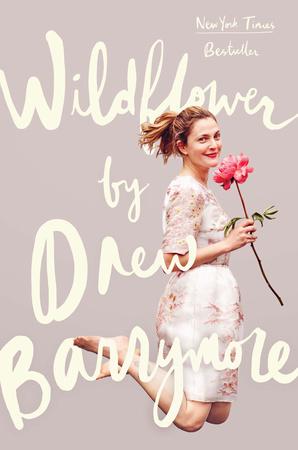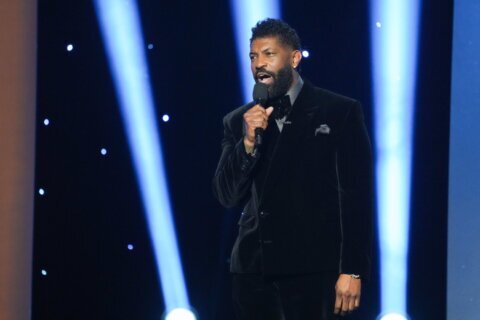
WASHINGTON — If you’re a pop culture junkie looking for a fun stocking stuffer this December, why not swap stories of “E.T.,” “Scream” and growing up among Hollywood royalty?
Drew Barrymore tells all in her new memoir “Wildflower.”
“I tried to write clear and concise, but I also tried to keep it unobvious and not so paint-by-the-numbers. It was such a pleasure to write. It came effortlessly, even though I put so much effort into it,” Barrymore tells WTOP.
“It didn’t feel like, ‘Oh God, I gotta go write again.’ I ran to the typewriter three days a week for two hours a day, and I got to be the kind of mom I want to be, which is with my kids.”
Barrymore says the book brought out a range of emotions.
“I actually was crying as I was typing … but I also was laughing all the way through it. I always wanted to write … but I just did not have the organized time, the bravery and probably enough life experience to feel like I had something to say or even perspective on my life, like humorous objectivity. It’s very personal. It’s my heart on a page, and yet it doesn’t cross any boundaries and become anything that I wouldn’t want my children to read.”
Her relationship with her children is far different from she and her own father, actor John Drew Barrymore (“Gunsmoke”), whom she describes as the “kind of man you saw in small doses.”
“He was just such an unreliable, hilarious tornado of a person. I think I equated him to part unicorn, part violent storm, and that’s what he was. It was very tumultuous, and sometimes honestly just downright scary, and as you get older, you get out of your fear and more into an equal footing with this person. Then by the end, he was unfortunately dying of cancer, and all of a sudden, I was the bigger stronger person. It’s funny how our relationship went full circle,” Barrymore says.
She says the full-circle experience allowed her to find peace with the relationship.
“I found him fascinating. I didn’t hold him accountable for not being an accountable person. There was a tremendous amount of forgiveness and understanding that we had between each other, which father to daughter who don’t have a healthy, orthodox relationship can really go the other way, and ours didn’t. It was very appreciating,” she says.
Her famous father was just one branch of the Barrymore family tree of fame. You could say she was destined to become an actress after paternal grandparents John Barrymore (“Grand Hotel”) and Dolores Costello (“The Magnificent Ambersons”), grand aunt Ethel Barrymore, the so-called First Lady of American Theatre, and grand uncle Lionel Barrymore, who appears on your television set every December as the villainous Mr. Potter in Frank Capra’s “It’s a Wonderful Life” (1946).
“Best Christmas movie in the world: ‘It’s a Wonderful Life.’ Unfortunately, I wish he was the one who turned it on for me. I just saw it when I was a really little kid and loved it so much. It was probably my mom that showed it to me. I didn’t really know any of them because they all passed away before I was born. I really only knew my father. Luckily, they left me this treasure box of books and movies and all of these wonderful ways to connect with them, albums with their voice on it. I have to idealize them from afar, although I feel so close and connected with them. Funny how the spiritual world works.”
Director Steven Spielberg once called Capra’s classic a “five-hanky movie” for its tear-jerking inspiration. So it’s only fitting that Spielberg would bring a six-year-old Drew to the silver screen in “E.T.: The Extra Terrestrial” (1982). Ironically, the memorable role only came after a failed audition for “Poltergeist” (1982), which Spielberg wrote and produced for director Tobe Hooper.
“I was just a kid actor going out on auditions and trying to land jobs, and (Spielberg) was sitting in for the director of that film, and he told me I was not right for this part. I was crushed. I thought I had really won him over with my crazy stories, a six-year-old’s imagination. Luckily, he said I’m making another movie. It’s called ‘A Boy’s Life,’ and I’d like you to come in and meet on that one. And I, through many auditions, ended up getting that part and having honestly what was just the most joyous experience of my life. They changed the film’s name after we made it, and called it ‘E.T.'”
Barrymore has fond memories of her fellow child actors Henry Thomas and Robert MacNaughton.
“We all had the best time. I called it ‘The School of E.T.’ because we all went to school together in this little school house. It was on this old Hollywood lot that had a very bungalow-like feeling. … We were in this little tiny schoolhouse, and we just had so much fun together. It was a real group of misfits. Everybody felt really empowered by Steven. Imaginations were allowed to run wild. It was such a healthy, safe, lovely environment. It really was one of the best experiences of my life,” she says.
In addition to her fellow actors, she cherishes getting to work across such a state-of-the-art puppet.
“I feel lucky, because he was actually in the room. I feel like now you’d be acting to a green screen and a tennis ball to be filled in later. I actually miss the era when puppetry existed and things were actually live on camera. I mean, it’s amazing what they can do on camera nowadays, so look, here we are, we’re only moving forward and better, but I kind of like kicking it old school with puppetry.”
Did the young actors ever sneak a bite of the Reese’s Pieces that Elliot left for his alien visitor?
“Totally. They were always on set. We definitely nibbled a few here and there,” Barrymore laughs.
Sadly, “E.T.” screenwriter Melissa Mathison passed away last month, not long after the death of another filmmaker that defined Barrymore’s career: horror master Wes Craven in “Scream” (1996).
“What a wonderful man. I have very strong memories of working with him. Harvey Weinstein and I were really passionate about him doing the film. We were like, hello, ‘A Nightmare on Elm Street!’ It had been at least 10 years since he did that. He’s just such a master. We thought, we really want this film to become something that can go on and on and on. If we could ever be so lucky to work with a master, it might reach that potential, so I worked really closely with him,” Barrymore says.
What a juicy, twisted sense of humor to have Barrymore — who taught E.T. to phone home — suddenly swapping horror trivia on her home’s phone before being sliced and diced by Craven’s Ghostfaced Killer. Twenty years later, the opening scene remains one of the genre’s most iconic.
“When I was doing my eight days of filming for the beginning part of the film, I was so close to (Craven) and actually told him this secret that if he told it to me (I would cry). I empowered him with this information that he could use, because I didn’t want to use any fake tears. I wanted to be crying. I don’t ever like to resort to glycerin running down my face. I was like, ‘I’m gonna have to cry for eight days straight, so let me tell you this thing.’ He would tell it back to me, and it always got me to cry.”
The Craven-Barrymore secret is one they’ll both take to the grave.
“I’ll just keep it between us. It’s nothing like salacious or weird, it was this thing I heard that happened in the world that upset me so much. It wasn’t even my own story. I was always very close to him because I didn’t want to talk to people between takes, because I had to be at such an agitated, flipped-out state, so I just stayed by his side. He was incredibly safe, and he was just the warmest, kindest, loveliest man. Funny how someone who is a king of a horror genre could be so gentle and so the opposite of what you would think he’d be,” she says.
And so, Barrymore is etched in Millennials’ minds the same way that Janet Leigh is to Baby Boomers after “Psycho” (1960), two blonde stars meeting shocking demises early in their respective flicks.
“I’m honored by the reference,” Barrymore laughs.
Beyond the movie memories — “Ever After” (1998), “Charlie’s Angels” (2000), “50 First Dates” (2004), “Fever Pitch” (2005) — and public appearances — who can forget her encounter with David Letterman? — Barrymore found her personal memories to be the most moving.
“Writing about my dog, Fluffy, and the 17 almost years we had together was incredibly emotional, and one of the stories I sort of had in the lighter category. I didn’t realize writing about my dad and writing about my mother’s father, and sitting in a Hawaiian hotel room with him, things that sort of came out of nowhere and made me realize they were a lot more profound than I even realized.”
Mixing profound observations with a personable tone, she feels it’s the perfect fit for a holiday read.
“It is a cheerful, optimistic book, and hopefully surprisingly emotional here and there. I wrote it with the feeling of such warmth, and I think that’s what you want and need around the holidays. You need to be enveloped in warmth. … Happy holidays!”







